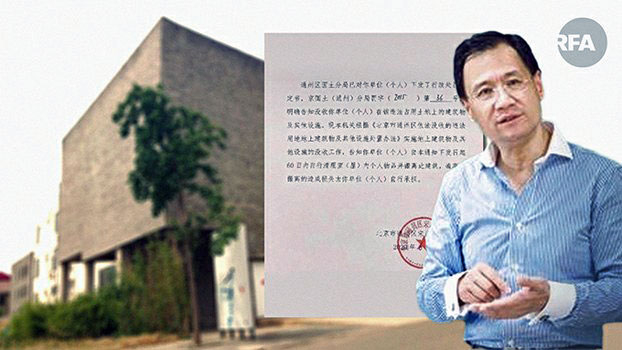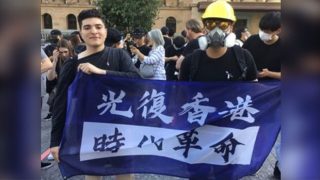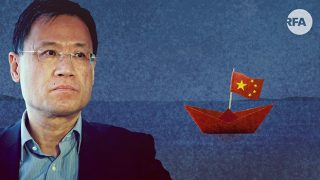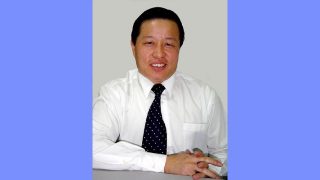
Chinese scholar Xu Zhangrun has penned a passionate call for solidarity among China’s embattled dissidents after his release from criminal detention, which came after he published several articles and open letters critical of the ruling Chinese Communist Party and its supreme leader Xi Jinping.
In an open letter to fellow alumni of Beijing’s Tsinghua University, which fired Xu after his release from prison earlier this month, Xu said he was “still healthy,” and could work hard to earn enough to eat.
He said he plans to make enough money to buy food through selling his writing.
He also hit out at ruling Chinese Communist Party officials for maintaining an “extravagant lifestyle” when most of the population are struggling to get by.
“Most of our compatriots are barely able to feed themselves and are struggling to survive,” he said.
“Half of China is under water and the rainstorms keep coming,” he added, in a reference to massive flooding across the Yangtze river basin this summer.
“The bad points of our political system won’t change, and countries around the world are starting to defend themselves against it,” Xu said, adding that Chinese academics are afraid to be isolated, so “languish” within it, not speaking out.
“But totalitarian power will be defeated, and freedom will finally come to my land,” he said, calling on Tsinghua alumni to redirect their financial donations “where it is most needed,” instead of giving the money to him.
“It is our responsibility and our fate to live through this time, to suffer, to keep the fires alive in the dark night, and to welcome the dawn,” he wrote.
Xu’s letter came after hundreds of Tsinghua alumni raised more than 100,000 yuan in donations to help Xu after he lost his job.
Moral courage
Canada-based lawyer Lai Jianping said he had been following Xu’s case closely, and that his latest letter sent out a loud message to fellow Chinese citizens and dissidents.
“The most important part is that he is thinking deeply about the future of the entire country and its people, and that he hasn’t lost faith or confidence,” Lai said.
“This is so valuable, because it is moral courage.”
“It’s quite hard for people like Professor Xu to make a living … although he could probably get paid for writing certain articles,” Lai said.
Independent journalist Gao Yu said the allegations of “seeking out prostitutes” were irrelevant, and that Xu is being targeted for his critical writings.
“This is a speech crime [Xu is being targeted with] … and the authorities … are trying to pretend it’s not,” Gao said.
“In the absence of material evidence, he is being framed,” she said. “They just pin prostitution charges on people.”
Authorities in Beijing detained Xu on the morning of July 6 after he called online for political reforms, on allegations of “seeking out prostitutes.”
He was released a week later, but later told the media that he had been fired from his teaching post and subjected to public sanctions for “moral corruption” by Tsinghua University’s law school.
Charges of “seeking out prostitutes” have been used before by the Chinese authorities to target peaceful critics and activists, or anyone who runs afoul of local officials and powerful vested interests.
Purge in the universities
Since party general secretary Xi Jinping began an indefinite term in office in March 2018, his administration has stepped up a purge of liberal intellectuals from higher education institutions.
Friends said at the time of Xu’s detention that it could be linked to the publication of one of his books in New York last month, a collection of some of his most controversial essays and articles.
Xu recently also criticized the Beijing municipal authorities for demolishing an artists’ village, and said that the administration of ruling Chinese Communist Party General Secretary Xi Jinping is taking China into “a dead end.”
In a 10,000-word essay dated May 21, 2020, Xu described China as isolated from “global civilization,” which would de-Sinicize in the wake of the coronavirus pandemic.
Wang Tiancheng, who directs the U.S.-based Institute for China’s Democratic Transition said China is growing more isolated internationally as a result of the pandemic.
“In the short term, it is clear that China is extremely isolated,” Wang said. But he added that there are many variables: “It is still too early to tell how things will pan out in the long run.”
“There are protocols in infectious disease control,” Wang said. “If a country doesn’t follow them, it is doomed to fail [in its attempts to control COVID-19]”
Sociology professor Guo Yuhua of Tsinghua University said China hasn’t really allowed civil society to play a role in its development.
“I don’t think China has acclimatized to international norms,” Guo said. “Regardless of whether a country is developed or developing, there is usually some form of civil society … which plays a certain role [in governance].”
Demand for an end to targeting
Xu’s essay called for China’s leaders to be held politically accountable, for the release of prisoners of conscience, including journalists and human rights lawyers, and for an end to the political targeting of academics.
Xu was notified by Tsinghua in April 2019 that he should cease performing any duties, after he published an article last July hitting out at the return of totalitarianism under the ruling Chinese Communist Party, including the abolition of presidential term limits and a cult of personality around Xi.
Xu has also called for amendments nodded through by China’s National People’s Congress (NPC) in 2018 to be revoked, and for an end to massive international expenditure to boost China’s influence overseas, as well as for legislation requiring officials to publish details of their assets and financial interests.
He had also published articles hitting out at “red” imperialism and calling for an upgrade to China’s political system.
Reported by Gao Feng for RFA’s Mandarin Service, and by the Cantonese Service. Translated and edited by Luisetta Mudie.
Source: Copyright © 1998-2016, RFA. Used with the permission of Radio Free Asia, 2025 M St. NW, Suite 300, Washington DC 20036. https://www.rfa.org.



